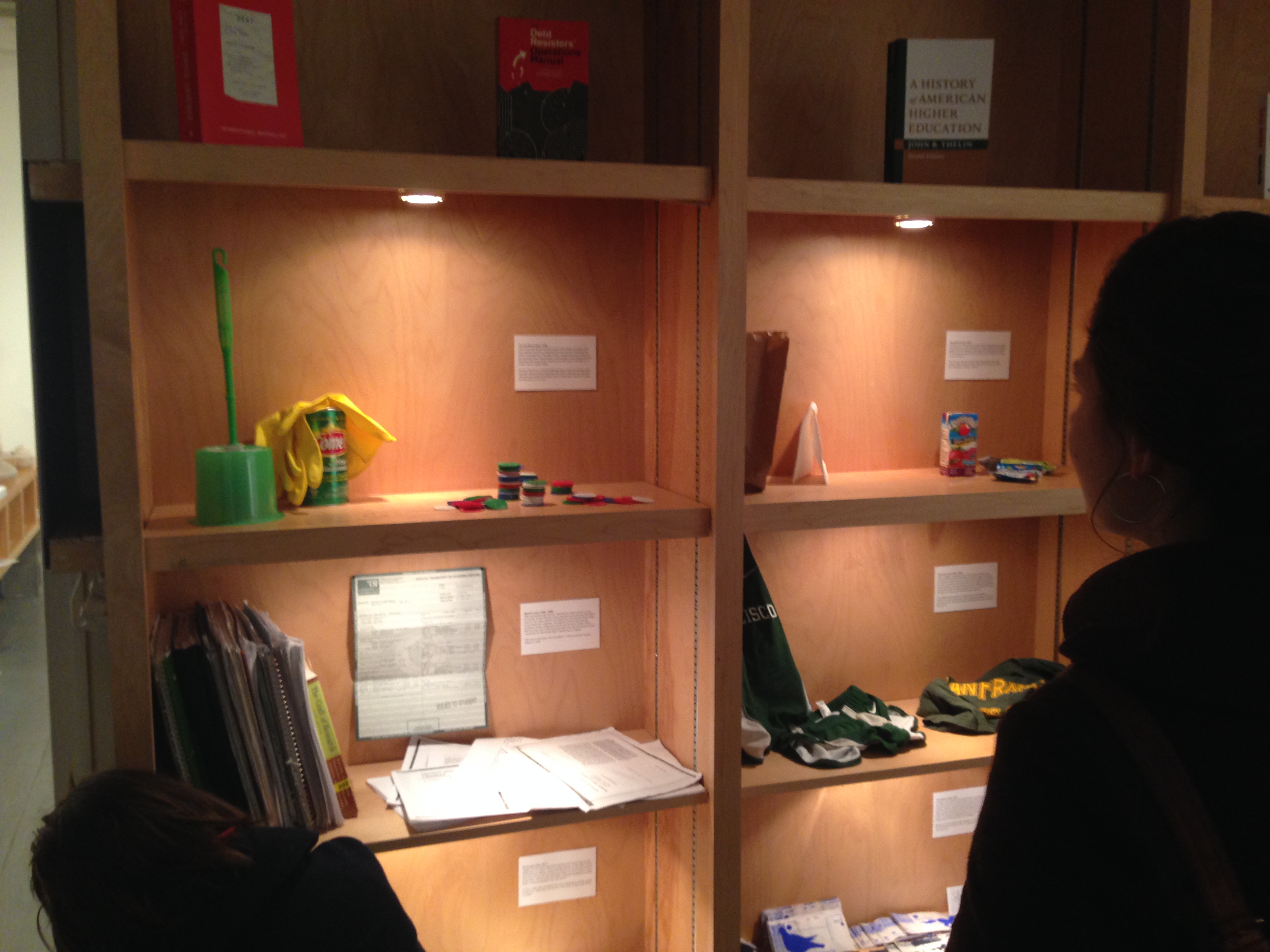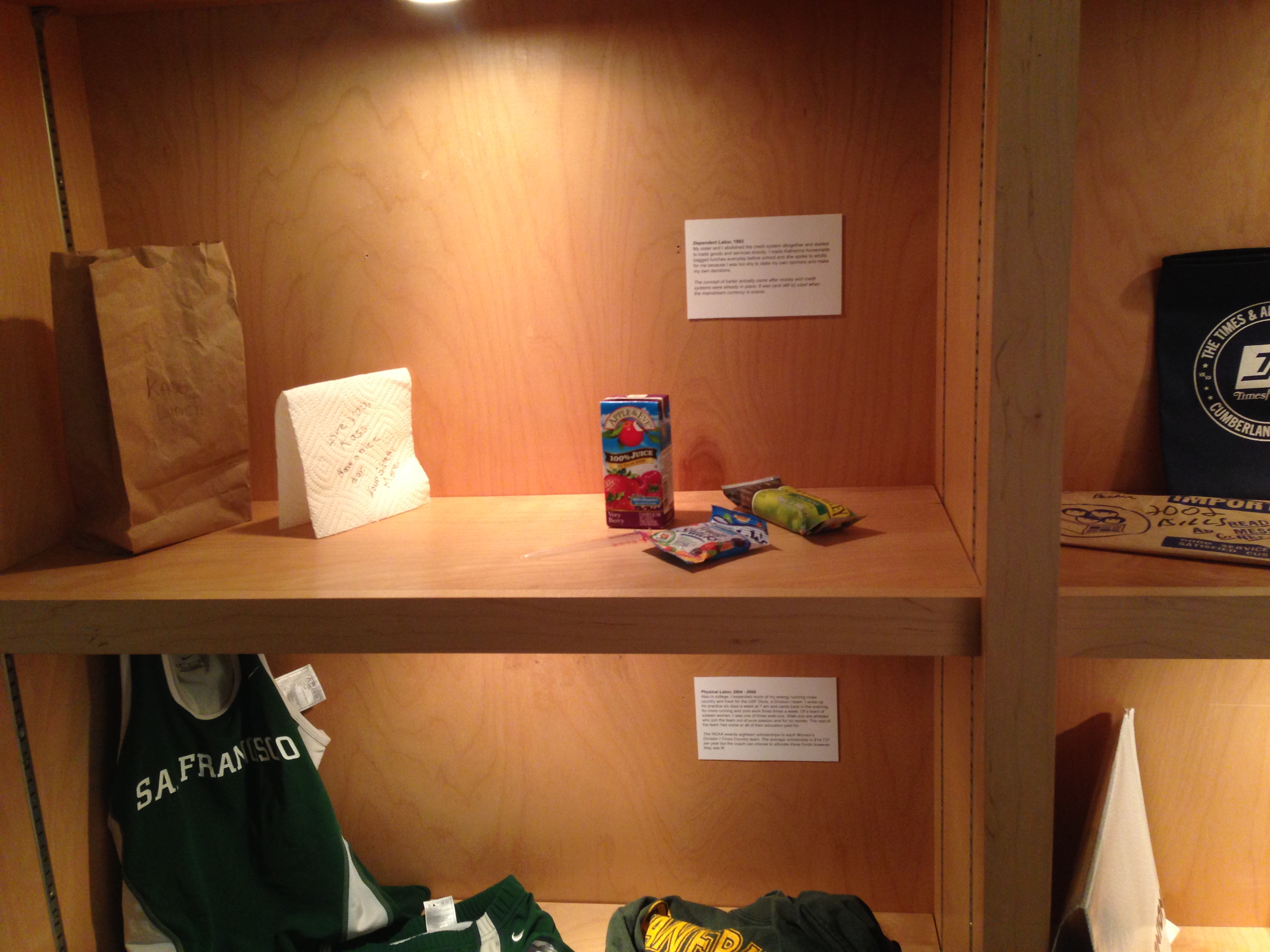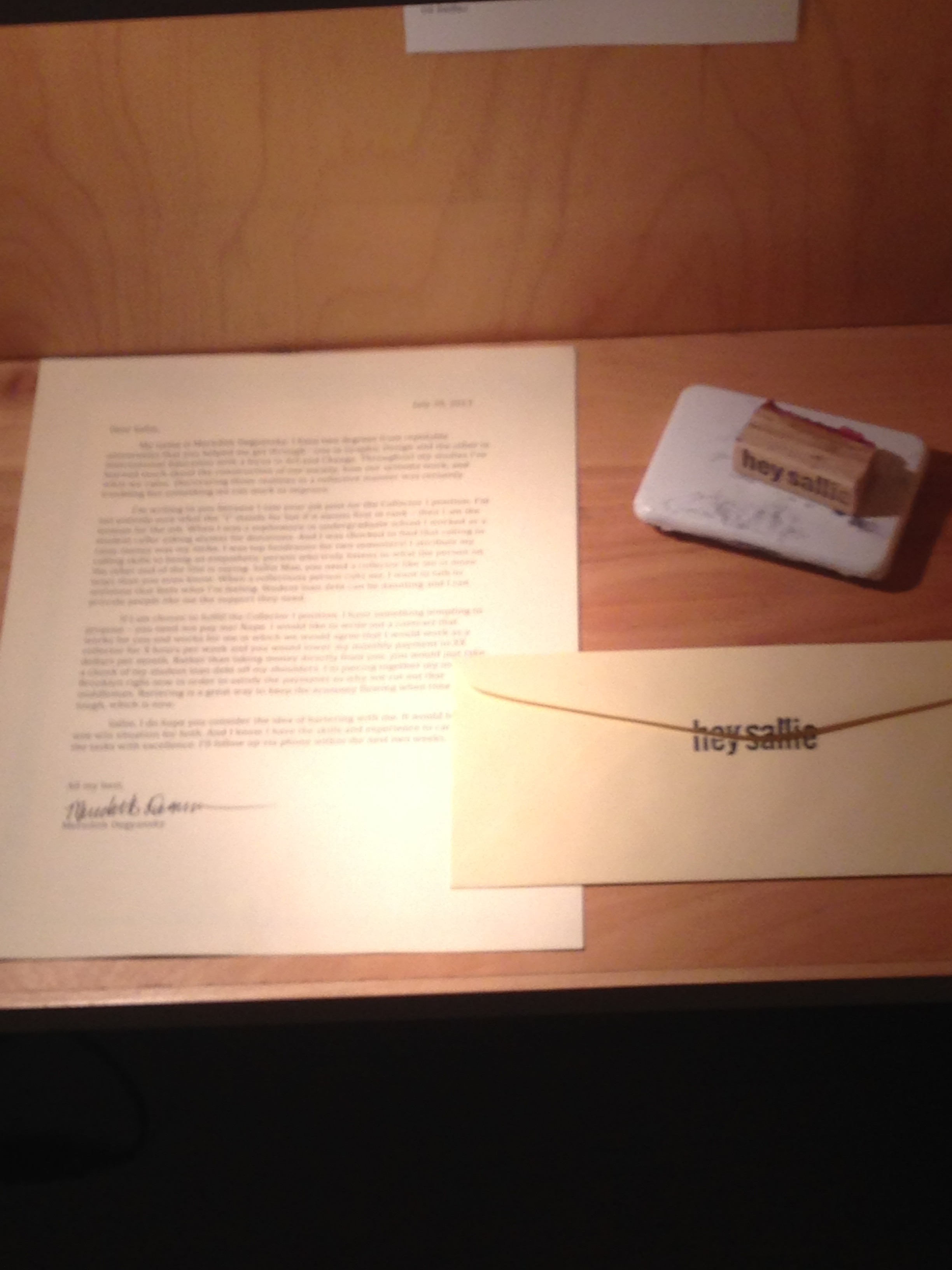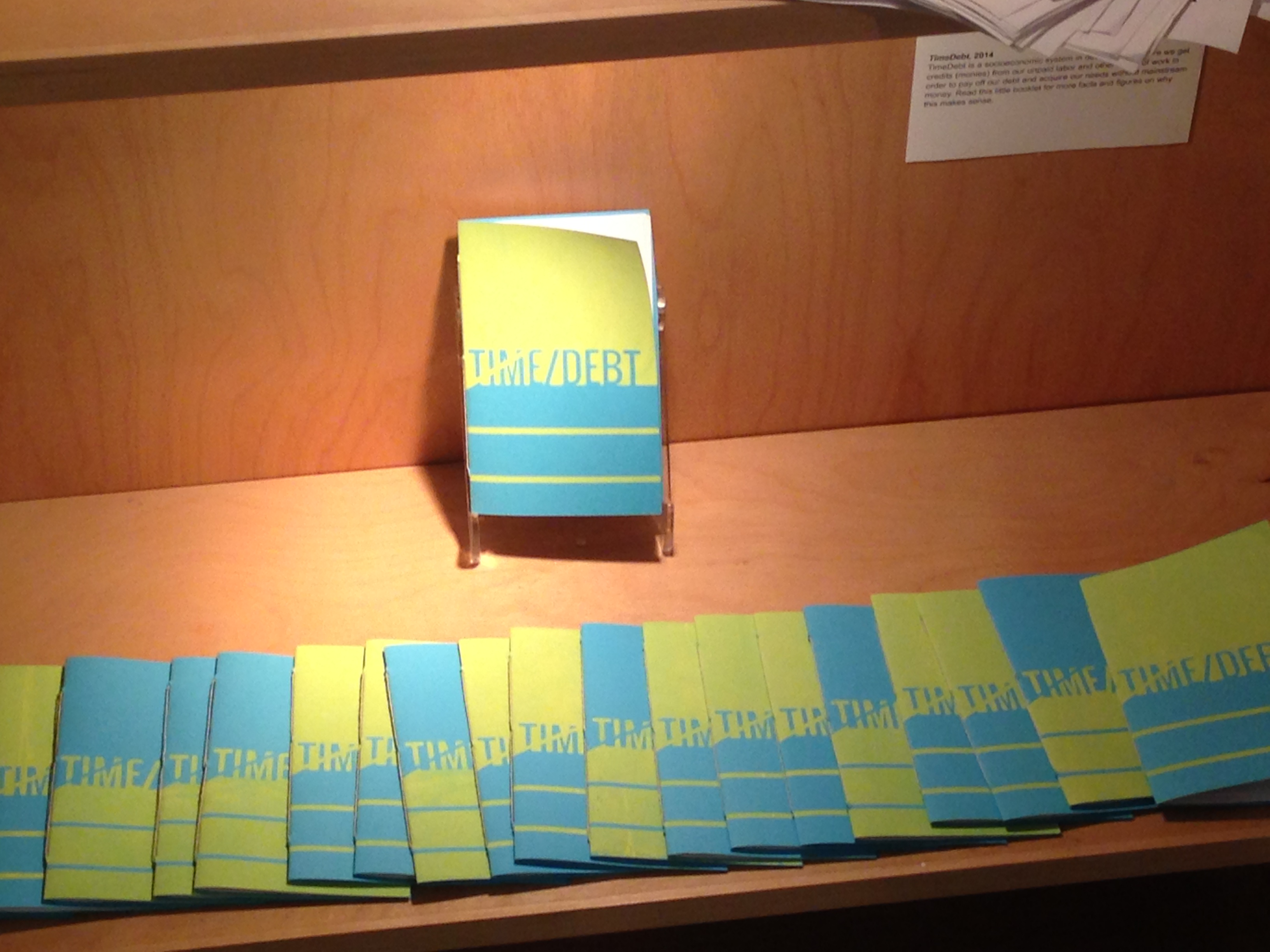By Matthew Morowitz
Meredith Degyansky works. As part of Art in Odd Places (AiOP) 2014: FREE, she was known as The Work Intern, offering her help to businesses along 14th Street in exchange for time, banking her labor for goods and services from these entities. Yet being The Work Intern is only one chapter in Meredith’s life in labor, a personal narrative she explores as part of a project-in-residence at Proteus Gowanus. Titled Indebted, Meredith has erected a wall of shelves with artifacts and accompanying text that delineates her life and her labor. The piece can be separated into three sections, each highlighting different temporal and ideological aspects of her journey. The first takes a look at her formative years, engaging in systems of service and learning the foundations of an exchange economy. The second shows her years in higher education, her entrance into the world of unpaid internships, and the false promises of this almost paradoxical system of paying to perform labor that might not result in a career. The last row explores the ways Meredith has reacted to her situation and the systems that engendered it, how she is seeking ways to create dialogue and propose alternatives to an economic system that has largely failed her and so many others.
Meredith in front of Indebted.
AiOP was able to attend the opening of this work on December 6, 2014, and talk with Meredith to learn more about her project, what influenced her, and what she hopes to accomplish. This work is part of a larger show, Labor, which will be on view at Proteus until February 22, 2015.
Can you tell me a little about your project?
The piece, Indebted, encompassing floor to ceiling shelves on one wall of the gallery represents my life in labor as a narrative moving row by row from top to bottom told through small notecards and found ephemera.
The story unfolds with small exchanges that are intuitive to us as young people such as doing chores, picking up after ourselves, and saying thank you. When I was a child, my mom paid us for our chores in poker chips but the poker chips we earned weren’t even worth anything material or monetary. But as a young child, the idea of “getting more” was incentive enough to keep cleaning. It also represents small gestures me and my sister did for each other that were never spoken of. I would pack her school lunches because I wanted to and she would – throughout my whole life – speak to adults for me. It moves onto a display of compensated-pre-higher-education-labor I completed as a teen such as delivering newspapers and waiting tables. The first row attempts to characterize the whimsical motions we go through in life, you know, the basic transactions we make with the community around us before we grow into the “real world”.
Indebted.
The second row represents the system we are thrown into; analyzing my education (which cost me a lot of money) and the irony of paying for education when we are actually laborers as students and in my case, a student-athlete. It then explores what happens when we get out of school, using my experience in serial unpaid internships that never led to paid gigs as a lens to look at a system of broken promises. Thus recognizing the conundrum several of us with liberal arts degrees from well-known universities fall into: uncompensated labor and loads of student debt.
A step-by-step guide on how to barter down your debt with Sallie Mae. Videographer: The Work Intern
In the final row I propose solutions for altering these systems that dominate most of our lives. Maybe we don’t need to spend this much money on school because it doesn’t seem to lead to a secure financial life? Is there another way to educate ourselves and each other outside of a formalized institution? What if we had more intimate relationships with our landlords, our local farmers, and even our neighbors? I detail a past project where I was attempting to barter down my student loan debt with Sallie Mae by offering my skills as a graphic designer, and lunch packing skills [to provide office lunches], which resulted in a satirical dissection on the inflexible and inhumane nature of corporations. It also reveals a currency I created, called Monies, to represent my unpaid labor, including both internships and invisible labor like household and community work.
Indebted.
Over the next three months at Proteus Gowanus, I will be hosting workshops and events that explore ideas of valuing our labor, valuing our time, paying our debt, and finding alternatives to the systems that are growing defunct.
Did your time with AiOP 2014: FREE as the Work Intern influence any of these ideas you have been encountering?
Definitely. For my AiOP project, called timebanks/14th, I worked at six different businesses on 14th Street. In exchange for my labor I was paid in Monies, where three Monies equal one hour of work. I’ve since been able to exchange those Monies for goods and services at those businesses. As much as I hate to run around spouting theoretical jargon, the project explored labor from a Marxist perspective. I went in thinking, “It would be awesome if our work lives were structured in such a way where we worked three hours at a farm stand for produce, three hours at a hair salon for a haircut, three hours at a vintage store for clothing, and three hours at a bodega for snacks”. I’d love to exist in a society where we’re constantly forced to do many different things, acquire many different skills, and also work with a range of different people. My experience with AiOP was amazing because I ended up having intimate one-on-one encounters with everybody that I worked with, people that I wouldn’t normally be around or interact with.
Indebted.
What kind of dialogues do you hope this project and your overall project will create down the line? What kinds of reactions do you want to see from the public?
I hope people start questioning this path that we’re all forced into, how horrifying and troubling it can be, and how it’s not necessarily promising anything. I’d like for fresh high school seniors to question the education that they are about to pay for, how they’re paying for it, why they’re going, and what they want from it. The practice of borrowing to pay for college needs to be much more transparent to young people. I have siblings right now who are 17 and 18-years-old and are getting ready to go on to the next thing and I’m asking them, “Do you need to go to college? How else can you educate yourself?” We need to think of alternatives to higher education, and in the same realm, think of alternatives to acquiring our needs in life. Through my experiences with labor, time, and money, I’ve developed a personal philosophy where my life focus is not on a career but rather on continuing to acquire a range of skills that I can exchange for what I need. I want to “work” less so I have more “time” – even though I’m not quite sure what either of those words mean yet.
Indebted.






